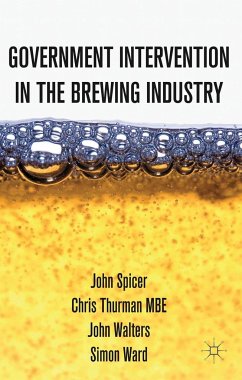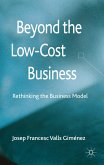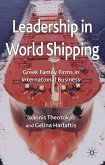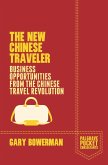This is the story of the radical intervention carried out by the Thatcher administration in response to 1986-89 Monopolies and Mergers Commission inquiry into brewing. It describes the creation of big brewers, the official investigations into what many saw as an uncompetitive structure and the damaging consequences for consumers and licensees.
' This book is a meticulously researched and fluently written account of an astonishing period in the history of its subject industry. It's as enjoyable a read as it is shocking. I urge Parliamentarians and civil servants to read it. It describes the perils of misconceived regulation, however well intended, and the damage that can be done to the interests of individuals and businesses through its unintended consequences. Although the authors' case study is the beer and pub industry, the lessons apply across the industrial spectrum and beyond'.
-Robert Humphreys, Honorary Secretary, the All Party Parliamentary Beer Group.
In the late 1980s many felt that the UK brewing and pub businesses were more dynamic and offering more choice both as to product and retail outlet than almost any other comparable businesses in the world. The constant governmental interventions into the brewing industry, as they were collectively known, culminating in the Beer Orders of the early 1990s, had a dramatic effect on the UK industry such that none of the six national brewers exist today; beer prices in pubs have escalated greatly and many pubs have closed. Given the virtual destruction of the UK brewing industry it is very important that an authoritative, well researched and highly readable book should be written to record the facts. This book, Intervention in the Modern UK Brewing Industry, traces the development of governmental intervention up to the Beer Orders and the consequences beyond. It is the culmination of excellent research and is certainly the major work on the modern industry today and will, I believe, remain so for a very long time. It is a book that will be invaluable to those who study the inter relationship of Government regulation and industrial economics, but will also appeal to a wide spectrum of the public who have an interest in the history of the beers and pubs that are dear to the heart of so many.
-Sir Ian Prosser, former Chairman & CEOof Bass PLC and then Chairman of InterContinental Hotels; currently a director of Sara Lee.
'A really thorough investigation of a fascinating period for the UK brewing industry. It reveals how fundamentally the industry was changed over a few years and how a government with the best intention managed to achieve exactly the opposite of what it intended. The book is clearly essential reading for anybody involved in the drinks or related industries, however it has relevance on a much wider scale'.
-Ian Shackleton, Managing Director, Nomura
'It is an extraordinarily well researched and authoritative study of the Brewing Industry and an essential read for anyone who wants to understand the events therein of the last 40 years or so. Perhaps more importantly it is also an insightful study into the way decisions are really taken by both the civil service and ministers. It tells us (p236) not only that '[Lord Young] contrived to replace one benign so-called monopolywith two pernicious ones' but also in great detail how this came about. I very much hope that it is widely read perhaps accompanied by a large 'don't go here again' sign. It cannot prevent repetition but it might just reduce it!
-Gavin Simonds, Chairman of Snell & Chairman of EzRevenue Management Solutions. Also ex Managing Director of Intercontinental Hotels.
'This book, written by four authors closely acquainted with its subject matter, chronicles the MMC's monopoly investigation into the 'Supply of Beer' from 1986, and its tumultuous aftermath, including the government's 'Beer Orders' and the various interactions with the European Commission. No-one emerges with particular credit from this account of the transformation of UK beer production and sale, but the book wisely avoids judgment, on the whole, (particularly on some of the more colourful personalities involved). Instead it shows how each step in the process proceeded logically forward to a result so far removed from the original intention that the reader is left wondering whether this is fact or fiction. If anything like this is ever tried again, here is a volume of object lessons to consult before the start. I recommend this book as a fascinating study of business, politics, theory, practice and error.
-Peter Freeman, Former Chairman of the Competition Commission
'This well-researched book should be of great interest to both academic economists and political scientists. The authors tell a fascinating story of policy failure played out over a twenty year period.'
-Professor John Greenaway, University of East Anglia
I believe that the book is of value to anyone concerned with the effects of governmental intervention in industry, especially through the application of competition law, and with economic history. Follow-up of competition law cases has been all too rare. While the implementation of competition law has become much, much more legally and economically
"sophisticated" since I started out in the field some 50 years ago, surprisingly little attention has been given to what one might call "the evidence". While I continue to believe that competition law has not only a valuable, but a necessary, role to play in controlling, and generally
preventing, collusion and exclusion, I think that overburdening it with attempts to realise wider goals, while profitable to lawyers, economists and administrators, has made a dubious contribution to welfare. I believe that empirical scrutiny, such as that provided by the book, is valuable and should be welcomed by all with interests, practical, commercial, legal, political and academic in this area.
Sir Jeremy Lever, KCMG, QC, Competition lawyer and Fellow of All Souls College Oxford.
-Robert Humphreys, Honorary Secretary, the All Party Parliamentary Beer Group.
In the late 1980s many felt that the UK brewing and pub businesses were more dynamic and offering more choice both as to product and retail outlet than almost any other comparable businesses in the world. The constant governmental interventions into the brewing industry, as they were collectively known, culminating in the Beer Orders of the early 1990s, had a dramatic effect on the UK industry such that none of the six national brewers exist today; beer prices in pubs have escalated greatly and many pubs have closed. Given the virtual destruction of the UK brewing industry it is very important that an authoritative, well researched and highly readable book should be written to record the facts. This book, Intervention in the Modern UK Brewing Industry, traces the development of governmental intervention up to the Beer Orders and the consequences beyond. It is the culmination of excellent research and is certainly the major work on the modern industry today and will, I believe, remain so for a very long time. It is a book that will be invaluable to those who study the inter relationship of Government regulation and industrial economics, but will also appeal to a wide spectrum of the public who have an interest in the history of the beers and pubs that are dear to the heart of so many.
-Sir Ian Prosser, former Chairman & CEOof Bass PLC and then Chairman of InterContinental Hotels; currently a director of Sara Lee.
'A really thorough investigation of a fascinating period for the UK brewing industry. It reveals how fundamentally the industry was changed over a few years and how a government with the best intention managed to achieve exactly the opposite of what it intended. The book is clearly essential reading for anybody involved in the drinks or related industries, however it has relevance on a much wider scale'.
-Ian Shackleton, Managing Director, Nomura
'It is an extraordinarily well researched and authoritative study of the Brewing Industry and an essential read for anyone who wants to understand the events therein of the last 40 years or so. Perhaps more importantly it is also an insightful study into the way decisions are really taken by both the civil service and ministers. It tells us (p236) not only that '[Lord Young] contrived to replace one benign so-called monopolywith two pernicious ones' but also in great detail how this came about. I very much hope that it is widely read perhaps accompanied by a large 'don't go here again' sign. It cannot prevent repetition but it might just reduce it!
-Gavin Simonds, Chairman of Snell & Chairman of EzRevenue Management Solutions. Also ex Managing Director of Intercontinental Hotels.
'This book, written by four authors closely acquainted with its subject matter, chronicles the MMC's monopoly investigation into the 'Supply of Beer' from 1986, and its tumultuous aftermath, including the government's 'Beer Orders' and the various interactions with the European Commission. No-one emerges with particular credit from this account of the transformation of UK beer production and sale, but the book wisely avoids judgment, on the whole, (particularly on some of the more colourful personalities involved). Instead it shows how each step in the process proceeded logically forward to a result so far removed from the original intention that the reader is left wondering whether this is fact or fiction. If anything like this is ever tried again, here is a volume of object lessons to consult before the start. I recommend this book as a fascinating study of business, politics, theory, practice and error.
-Peter Freeman, Former Chairman of the Competition Commission
'This well-researched book should be of great interest to both academic economists and political scientists. The authors tell a fascinating story of policy failure played out over a twenty year period.'
-Professor John Greenaway, University of East Anglia
I believe that the book is of value to anyone concerned with the effects of governmental intervention in industry, especially through the application of competition law, and with economic history. Follow-up of competition law cases has been all too rare. While the implementation of competition law has become much, much more legally and economically
"sophisticated" since I started out in the field some 50 years ago, surprisingly little attention has been given to what one might call "the evidence". While I continue to believe that competition law has not only a valuable, but a necessary, role to play in controlling, and generally
preventing, collusion and exclusion, I think that overburdening it with attempts to realise wider goals, while profitable to lawyers, economists and administrators, has made a dubious contribution to welfare. I believe that empirical scrutiny, such as that provided by the book, is valuable and should be welcomed by all with interests, practical, commercial, legal, political and academic in this area.
Sir Jeremy Lever, KCMG, QC, Competition lawyer and Fellow of All Souls College Oxford.








